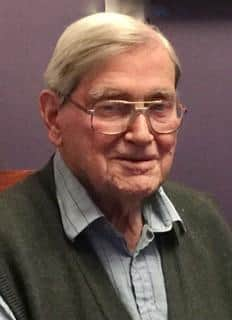Obituaries, Douglas Malcolm OBE, ecologist who had a huge impact on UK forestry
Douglas Malcolm made an enormous contribution to the science and practice of forestry, principally the silviculture and soils of UK forests. While he supported, through his research and teaching, the relatively simple systems practised in UK commercial forestry, he made valuable contributions to the understanding of more complex diverse systems with a wider range of tree species, particularly native species.
Through his teaching, scientific publications and advice, Douglas helped to create future generations of foresters with the broad understanding and appreciation of forestry that is critical to today’s scientists, managers, policy makers and operational foresters. The balanced approach he espoused is essential if the sector is to design and manage the forests, woodlands and trees that cope with the threats of climate changes, pests, diseases and storms while fulfilling their potential to mitigate climate change and biodiversity loss.
Advertisement
Hide AdAdvertisement
Hide AdDouglas Cunningham Malcolm was born in Calcutta in 1930 to Robert and Elizabeth Malcolm, a brother to Robert. Although his earliest years were spent in India, he was educated in Edinburgh, first at Gillsland Park Primary School and then at George Watson’s. After the death of his father when Douglas was 12, he was brought up by his mother in Edinburgh and as a Watsonian developed a love of rugby, playing for Watsonian’s and continuing to enjoy the game for the rest of his life.


In 1954 Douglas graduated from the University of Edinburgh with a BSc (First Class Honours) and joined the Forestry Commission as a District Forest Officer in Sherwood Forest. He then returned to the University of Edinburgh to lecture in the new ecology degree (in his case ecology came with a strong forestry flavour). In 1987 Douglas was appointed Head of the Department of Forestry and Natural Resources and subsequently Convenor of the School of Forestry in the Institute of Ecology and Resource Management.
Douglas married Maryon Jean Wardrop – Jean – in 1957. Together they had four daughters Elizabeth, Lindesay, Katharine and Kirsty, and then grandchildren Bill, Alastair, Hamish, Andrew, Lily and Mirren. Although Douglas and Jean separated in 1983, they remained close friends. In later life Douglas become close to Felicity Cooklin, known as Fiz, and her children Charley, Danny and Lisa.
Douglas’s love of forests was steadfast and infectious. He instilled this love into each intake of undergraduates and postgraduates he supervised. During his time as Head of Department he established a highly regarded and truly international Masters course at a time when no-one else was doing such a thing.
Douglas loved to plant trees, especially native trees – some of his collection at Bawsinch near Duddingston became a Scottish Wildlife Trust reserve and is now a valuable teaching resource. Although he made major scientific contributions to our understanding of the factors that influenced the success or failure of afforestation in upland Britain, Douglas was always convinced that the establishment of plantations should be seen as the first stage in the development of “properly structured and ecologically sustainable forests”. To this end, he took steps to ensure the continuation of Professor Mark Anderson’s trial area at Glentress through the 1970s and ‘80s. When interest in Continuous Cover Forestry revived in the 1990s, he was an active supporter of this approach and helped to organise the major 1999 IUFRO conference Transformation of Plantation Forests, at which he presented a much-quoted keynote paper.
A lifelong promoter of native hardwood species, Douglas saw the potential for encouraging the regeneration and planting of more birch woodlands in Scotland. Along with Dr Rick Worrell he started selecting superior trees for good form and growth rate, latterly under the umbrella of Future Trees Trust. The improved birch planting stock now available from seed orchards via commercial nurseries is a valuable legacy of his vision.
Over 34 years, Douglas published many scientific papers in national and international peer-reviewed journals, often jointly with his PhD students. Initially these focused on nutrient availability and tree growth but over time broadened to include genetic variation and the transformation of simple to complex, more diverse stands. As a joint editor of two key publications (The Ecology of Even-Aged Forest Plantations in 1979 and Broadleaves in Britain in 1984) he established his reputation as a skilful editor. He was the driving force behind influential conference “The Sitka spruce symposium” in 1986. His influence spread as his students progressed their careers, not only throughout the UK but globally, especially to Canada and as far away as Australia, New Zealand and Malaysia. Many of Douglas’s students went on to succeed at the highest level of the profession. Looking back on our own student days, two memories stand out: you could tell when Douglas was in the building from the smell of his tobacco and all field visits involved a sturdy spade that could be used to dig a substantial soil pit.
Douglas was President of the Institute of Chartered Foresters from 1988 to 1990 and for many years edited the Institute’s journal. Following his retirement, he was President of the Botanical Society of Scotland from 2004-2006. In recognition of Douglas’s services to forestry, he was awarded the OBE in 1994.
Advertisement
Hide AdAdvertisement
Hide AdHumans don’t have the lifespan of his best friends the trees. Douglas died in the good care of Ashley Court Nursing Home on 17 May 2022.
OBITUARIES
If you would like to submit an obituary (800-1000 words preferred, with jpeg image), or have a suggestion for a subject, contact [email protected]
SUBSCRIBE
Subscribe at www.scotsman.com/subscriptions
